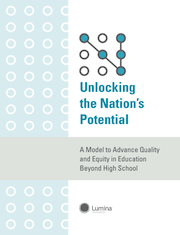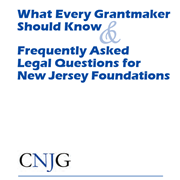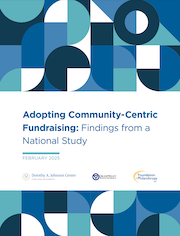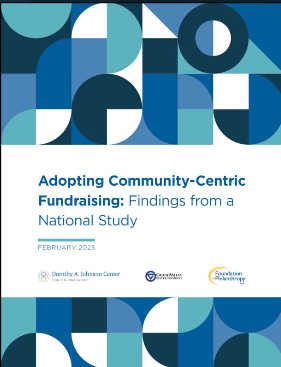Site Search
- resource provided by the Forum Network Knowledgebase.
Search Tip: Search with " " to find exact matches.
When considering how to improve health outcomes for low-income individuals, most people think about providing access to good medical care and keeping the cost of that care as low as possible. What people rarely think about is the connection between good health and quality affordable housing.
FAQs for Benefit Survey
What is the New Jersey Foundation Benefits & Salary Summary Report?
Developed exclusively for CNJG members, the New Jersey Foundation Benefits & Salary Summary Report presents comprehensive benefits data specific to New Jersey's grantmaking community, alongside data from the Council on Foundations' annual salary survey. The last report, produced in 2017, can be found on our website.
Given increased scrutiny in the areas of compensation and benefits, the need to benchmark this information within the field has become even more important. The 2020 New Jersey Foundation Benefits & Salary Summary Report will make available critical information needed to determine fair compensation and benefits in the state across multiple organizational levels.
Who is eligible to participate in this survey?
To be eligible to participate in the survey, your organization must have at least one PAID (full-time or part-time) employee. The beginning of the survey will help respondents determine if they are eligible to participate. Even if you are NOT eligible to participate, please complete the first four questions of the survey. You will then be directed to the last page of the survey where you will be asked to submit your data. You do not need to be a CNJG member to participate. If you do participate, but are not a CNJG member, you will receive a copy of the report.
Where do I complete the survey?
The survey may be completed here: https://www.surveymonkey.com/r/2020CNJGBenefitsSurvey.
When does the survey need to be completed?
The deadline for submitting completed surveys is August 10, 2020.
I'm not the right person to complete this survey, can I email it to someone else to complete?
You may forward the email that contains the survey link to someone else in your organization. The recipient will be able to click on the survey link to access the survey.
How long will it take to complete the survey?
It is estimated that entering in the data should take around one hour (not including the time it will take to research your organization’s information). If you offer more benefits, it may take more time; if you offer less, the less time it will take to complete. Logic is built into the online survey, enabling you to skip questions or entire sections depending on what your organization offers. CNJG suggests looking through the questions first (available in PDF form) and compiling your answers to then enter in the data all at once online.
How do I submit our information to the survey?
CNJG developed the survey using SurveyMonkey, so that you may enter all of your data online. The prompts at the bottom of each page guide you as you enter your information.
Can I see all of the questions first?
Yes! The survey in its entirety can be found below. Feel free to use this document to gather your benefits data, and then enter the information all at once online at https://www.surveymonkey.com/r/2020CNJGBenefitsSurvey.
For which year/time period should I provide compensation and benefits data?
The Benefits Survey should be based on benefits data for the 2020 calendar year. Please complete the survey questions by indicating the benefits that your organization is currently offering to employees in 2020.
Help! The way that this question is structured is difficult (or impossible) for me to answer.
We understand organizations provide different kinds of benefits and have developed novel benefit packages. And, often, benefit packages differ within an organization. Please complete the survey questions by indicating the benefits that are offered to the majority of employees in your organization, and please use the comment boxes after some of the questions and at the end of the survey to further explain/clarify your responses. Please also note that, while many questions are required (indicated with an asterisk) some questions in the survey are optional and can be skipped.
Once I've started the survey, can I save it and complete it another time?
Yes! You may leave the survey at any time by clicking on "Exit this survey" on the upper right hand corner of the page. Note: if you have just entered a page of data, proceed to the next page before you exit, otherwise the data just entered for the current page will not be saved. To reopen the survey, click on the link in the survey email that was sent to you.
Once I've completed the survey, how do I submit my input?
To submit your input, go to the last page of the survey and click on "Submit Survey." Your input will automatically be submitted.
I clicked on "Submit Survey," but I wasn't finished completing the survey - what should I do?
To make changes in a survey that has already been submitted, please contact Craig Weinrich. It will be possible for you to make changes to your survey input until the survey is officially closed on August 10, 2020.
What topics will be covered?
The following topics will be covered in the survey:
• Survey Eligibility
• Organization Information
• Employment
• Leave Benefits
• Insurance Benefits
• Retirement
• Other Benefits
• Retiree Benefits
• Benefits Cost
Who do I contact if I have questions?
Should you have any questions or need additional information, please contact Craig Weinrich.
CNJG thanks you in advance for your time and assistance with this endeavor. The report that we create becomes an important tool for you to benchmark your salaries and benefits plans for the coming years, so the time and effort will be incredibly valuable to your organization and other CNJG members.
The New Jersey Bankers Association’s Charitable Foundation recently announced it will donate $50,000 to the veterans’ programs at four New Jersey colleges: Fairleigh Dickinson University, Monmouth University, Rider University and Rutgers University.
The donations will be awarded in January.
“The New Jersey banking industry has always made giving back, and supporting our local institutions, a priority,” NJBankers CEO John McWeeney said. “Our ongoing support of these valuable programs allows us to recognize those men and women who have volunteered to protect our country in the armed forces.”
A CNJG member queried our listserves on policies regarding: 1) number of vacation days for new full-time employees; 2) paid time off (PTO); and 3) working remotely. CNJG compiled the answers from responding members.
CNJG’s Finance and Investment Affinity Group exists to keep foundation executives informed as they manage the investment of their corpus. Growth of foundation assets and the active exchange of sound investment strategies is the focus of each program.
As stewards of your organization’s assets, you’ve likely had discussions at the Board level regarding the merits of incorporating Values-Based Investing (“VBI”) approaches into the investment program. As the industry has evolved, VBI incorporates Socially Responsible Investing, Environmental Social & Governance (“ESG”), and Impact Investing. While the opportunity and investment thesis for capturing VBI attributes are well articulated across the industry, a cautious and thoughtful approach is warranted. VBI should not be “one size fits all”; rather, a customized opportunity exists to reflect your organization’s values across the investment portfolio. Further, given the meteoric rise of VBI across the investment industry, there are a plethora of products that claim to incorporate responsible principles; however, a closer examination may raise doubts about the value-add being provided, especially on a net of fees basis. Lastly, certain VBI arenas such as ESG have unfortunately become a hot-button political issue, with both ends of the spectrum equating ESG investing with other political agendas. When considering the appropriateness of VBI for your organization, we believe it is important for the Board to have a clear understanding of the opportunities and challenges involved.
Agenda
8:30 a.m. - Breakfast
9:00 a.m. - Program begins
10:00 a.m. - Meeting concludes
Cost: $35 for CNJG Members; $70 for Non Member Grantmakers (includes full breakfast)
Nonprofit Finance Fund's Annual Survey chronicles the challenges facing the nonprofit sector and calls out some of the targeted investments we can start to agree on as a society to salvage the investment we have collectively made in our social infrastructure. We believe that a coordinated intervention now will not only better prepare us for inevitable future economic crises; it can lead to a happier, healthier community for us all.
The National Center for Family Philanthropy and Youth Philanthropy Connect, a program of the Frieda C. Fox Foundation, have joined together to bring new resources to the field of philanthropy focused on engaging the next generation of donors and family members. Igniting the Spark: Creating Effective Next Gen Boards is the first publication of its kind, offering a comprehensive overview of the growing practice among family foundations and donor advised fund holders of using next generation boards.
The issue brief outlines creative options for involving children as young as 8 in family philanthropy. It is supplemented by case studies of seven foundations using next gen boards and other approaches for engaging youth in philanthropy. Throughout both resources, the voices of next gen donors describe what works — and what doesn’t — providing family members and staff with guidance and insights new to the field.
Despite a field replete with research, analysis, recommended policies and practices — not to mention an abundance of educational programs and frameworks for grantmaking to diverse communities — philanthropic leaders have been slow to advance these values in their foundations. Philanthropy Northwest (PNW) wondered: what is getting in the way? Why are good intentions, buttressed with theory and practical advice, not achieving better results on measures of diversity, equity and inclusion?
With the support of the D5 Coalition, PNW began a year-long study to explore these questions. The study was divided into two parts. They began with personal interviews of 23 philanthropic leaders in the Pacific Northwest. In order to better understand how these organizations incorporated diversity, equity, and inclusion into their work and workplaces, they collected baseline information about their staff composition, leadership styles, and organizational practices/policies.
This report details their findings. It includes an in-depth look at the peer cohort model, in which ten foundation leaders met regularly to discuss these issues and support each other in advancing their own leadership. It also includes practical lessons about shifting organizational cultures towards greater diversity, equity and inclusion — lessons drawn directly from the experiences of peer cohort leaders.
PNW presented this work in a webinar hosted by the D5 Coalition. The webinar recording and slides are below.
This weekly conference call series welcomed New Jersey-based grantmakers along with national funders and provided an opportunity for grantmakers to hear from a wide range of experts in the field of disaster philanthropy. This series started on September 9, 2013 and concluded on November 4, 2013. The written summaries of each recording are listed below.
Which staffing models will work best for your family philanthropy? How can the right structure enhance the effectiveness and efficiency of your organization?
We will examine different approaches, including hiring dedicated philanthropic professionals and family members, and utilizing external advisors and consultants. You will learn how to align staffing strategieswith your philanthropic goals, create a collaborative work environment, and ensure that the right expertise is in place to drive impact.
Whether you’re looking to grow, professionalize, or prepare for transition, this session will offer practical guidance on building a structure that supports both mission and operational excellence.
Cost: This event is free for CNJG Members who are family foundations.
Other types of foundations are ineligible to join this webinar.
This program is a CNJG membership benefit for family foundation members, including staff and trustees, in partnership with the National Center for Family Philanthropy.

A report from Lumina Foundation and its Quality Credentials Task Force calls for a coordinated national effort to ensure equitable access to quality postsecondary education in the United States.
The report, Unlocking the Nation's Potential: A Model to Advance Quality and Equity in Education Beyond High School (32 pages, PDF), found that the current U.S. system of degrees, certificates, industry certifications, and other credentials lacks a comprehensive definition of quality as well as the kind of up-to-date indicators needed to drive improvements in policies and practices. To help guide efforts that ensure access to high-quality educational opportunities for students of color and advance racially and economically just outcomes, the task force — which includes nearly two dozen education, policy, and workforce development leaders — proposes a model based on a shared understanding of what a quality credential is, as well as institution-based curricular changes and systemic reforms at the federal and state levels.

This guide was designed to help the state’s philanthropic community understand their ethical, legal, and fiduciary requirements and obligations.

This national study examines the adoption of Community-Centric Fundraising (CCF) practices across U.S. nonprofit organizations. Proposed in 2019, CCF is a set of principles developed by people of color to align fundraising with movements for race, equity, and social justice. Based on survey responses from 283 organizations and in-depth interviews with 14 fundraising professionals, the research revealed both promising developments and persistent challenges in transforming established fundraising approaches.

This national study examines the adoption of Community-Centric Fundraising (CCF) practices across U.S. nonprofit organizations. Proposed in 2019, CCF is a set of principles developed by people of color to align fundraising with movements for race, equity, and social justice. Based on survey responses from 283 organizations and in-depth interviews with 14 fundraising professionals, the research revealed both promising developments and persistent challenges in transforming established fundraising approaches.
